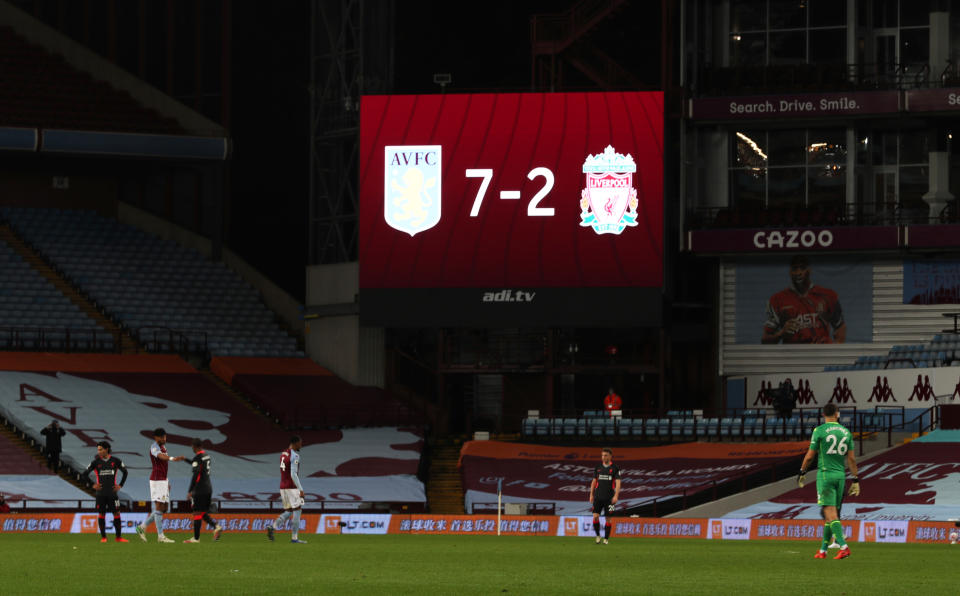How do we begin to explain Liverpool and Manchester United's astonishing capitulations this weekend?
Now what?
Where do we go from here?
What are we supposed to do next when the defending Premier League champions, with a starting lineup at full strength, get smashed 7-2 by a team that avoided relegation by a single point last season? When a Liverpool side that is unchanged from the one that, for most of the 2019-20 campaign, looked like it would easily post the highest points total ever until the pandemic interrupted its momentum, ships seven against a team that barely scored a goal per game a year ago?
What, for that matter, are we to make of Manchester United and its 6-1 capitulation to visiting Tottenham Hotspur? When United’s backline, cumulatively acquired for very nearly a quarter of a billion dollars in transfer fees alone, concedes half a dozen goals in a single afternoon?
Where does that leave us?
Going into this bizarre Premier League season — the one still very much played in a pandemic, to empty stadiums, with a short offseason and a congested schedule — there was a sense that conditions were unusual and that this might make it more unpredictable. And, sure enough, going into this weekend it had delivered a series of topsy-turvy games and confounding scores.
The 2020-21 season’s average goals per game already stood at a towering 3.68, about a goal up from most every Premier League season before it. After Sunday offered up the above results, that number climbed to a vertiginous 3.79.
It is, of course, still very early in the season. And the hallucinatory effects of these first hazy weeks may wear off. Things may regress to the mean. They probably will. That’s what the mean is for: regressing to. The reckoning of reason, though, hasn’t come yet. This is only a gut feeling, but the sense is akin to the one in Leicester City’s stupefying 2015-16 run to the title, when it churned out narrow wins as every better-qualified title contender insisted on faltering in fresh ways.
But how does that explain the complete collapse of two elite teams? Or one elite team and another one that seemed, at last, to have turned a corner and laid out a roadmap back to the top in the latter half of last season?
United’s collapse was the less surprising one. The Red Devils had already given up five goals in their first two league games of the season. They had been hammered 3-1 by Crystal Palace and only beaten Brighton 3-2 thanks to a 100th-minute penalty last weekend. This time, Ole Gunnar Solskjaer’s men actually went ahead, and then it all went wrong. Harry Maguire, the centerpiece of that pricey defense, bungled his way to giving up the equalizer and Spurs had a straightforward night from there on out.
And sure, Erik Lamela provoked and played up the slap from Anthony Martial that got the latter sent off. But then United could have suffered two more expulsions by Eric Bailly and Luke Shaw — fellow members of that lamentable back line — but was spared, so complaints ring hollow. And yes, Spurs, for its own sundry issues, has a powerful attack that can take just about anybody apart with its speed and poise. Still, United’s malpractice in the back was breathtaking nonetheless.

Liverpool’s night was utterly inexplicable. It surrendered a hat trick to Ollie Watkins, the first Premier League goals for a forward still playing in League Two just four seasons ago.
Jurgen Klopp couldn’t explain it either. “We played into their hands, with all the goals,” he said, per Reuters. “All the things you should not do in a football match we did tonight, but all credit to Aston Vila, as they forced us to do those things.
“It was unexpected but it happened tonight. For me it wasn't a specific moment, we put all our rubbish things and mistakes in one game and hopefully we can start again. Tonight wasn't sloppy, it was just bad.”
None of those things explain this remarkable result, producing the most goals conceded in Liverpool’s Premier League history. Then again, Villa manager Dean Smith had no coherent theory either, ascribing the lopsided win to hard work and the game plan, as if all you need to beat one of Europe’s elite sides is a can-do attitude and a clever ploy.
Meanwhile, Everton leads the table after four weeks with a perfect record and 12 goals scored. Aston Villa has 11 after just three matches. Leicester City has a dozen as well. And while Liverpool, Chelsea and Spurs are as productive as you would expect, with double-digit goal tallies, the thought that lingers is that so many Premier League teams now have a strong attack that more pressure is placed on defenses than ever.
You get turned. You step late. You lose a man. A goal goes in. And then another. The bottom falls out. Before you know, you’ve set a club record. Not the good kind. It just seems to be happening all the time now. It was only a week ago when Manchester City was hammered 5-2 at home by Leicester — the most goals conceded in Pep Guardiola’s managerial career.
The riches in the Premier League are such that even the middle-class teams can afford world-class attacks. Or at the very least, that they can resist pressure to sell their top attacking players and build something cohesive and effective.
Or maybe it’s something else. Something entirely inexplicable. But until the Premier League back lines figure it out, chaos will eagerly prolong its reign.
Leander Schaerlaeckens is a Yahoo Sports soccer columnist and a sports communication lecturer at Marist College. Follow him on Twitter @LeanderAlphabet.
More from Yahoo Sports:

 Yahoo Finance
Yahoo Finance 
